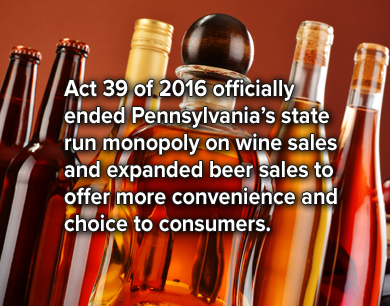Offering consumers choice and convenience through liquor reform is moving Pennsylvania’s economy into the 21st century.
 For more than 80 years following the end of Prohibition, Pennsylvania retained state control over the sale of wine and spirits. This resulted in a phenomenon known as “border bleed” in which significant revenue was lost annually to neighboring states that offered better prices and more selection in their products. The PA Chamber believed that the state should not be in the business of selling alcohol while at the same time enforcing liquor laws; and promoted reforms that would give consumers the convenience and choice they desired while allowing the private sector to compete with other states.
For more than 80 years following the end of Prohibition, Pennsylvania retained state control over the sale of wine and spirits. This resulted in a phenomenon known as “border bleed” in which significant revenue was lost annually to neighboring states that offered better prices and more selection in their products. The PA Chamber believed that the state should not be in the business of selling alcohol while at the same time enforcing liquor laws; and promoted reforms that would give consumers the convenience and choice they desired while allowing the private sector to compete with other states.
Unfortunately a full-scale privatization measure was vetoed by Gov. Tom Wolf in July 2015; however, Act 39 of 2016 implemented sweeping reforms allowing for the private sector sale of wine in grocery stores; takeout wine sales in licensed restaurants, bars, hotels, supermarkets and delis; and takeout beer licensees to sell up to four bottles of wine to go, among other administrative improvements to the current state store system. In addition, Act 166 of 2016 reformed the state’s beer laws to allow distributors to sell six-packs, single bottles of beer and growlers, on top of the cases and 12-packs that were already permitted. This law also permitted the direct shipment of beer by out of state retailers or wholesalers; allowed breweries to sell beer produced by another brewery for on-premise consumption; and extended Sunday sales hours to begin at 9 a.m. While these reforms are a step in the right direction, the PA Chamber continues to advocate for additional changes to the state’s alcohol laws that will increase private sector opportunities in this arena.